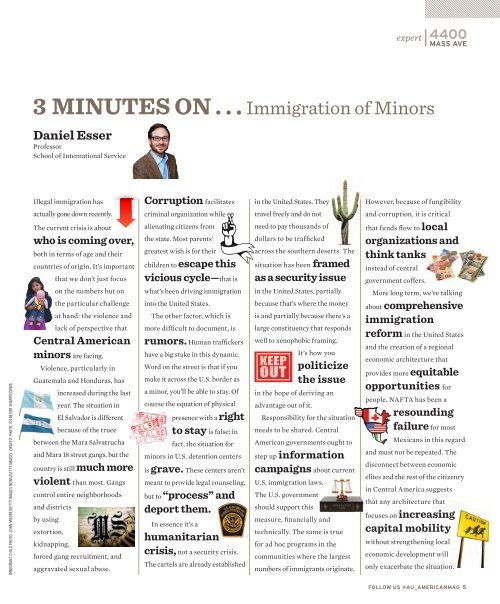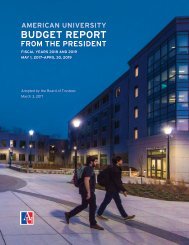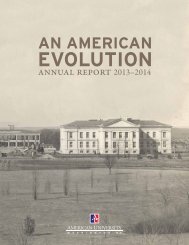American Magazine November 2014
This issue, explore 92 impacts of the landmark Civil Rights Act of 1964; browse images by Yemeni photographer Boushra Almutawakel, Kogod/BSBA '94; learn about Constantine Stavropoulos's, Kogod/BSBA '87, new café at the Washington National Cathedral; and hop on the Metro to the Archives-Navy Memorial-Penn Quarter stop. Also in the November issue: Freshman Service Experience celebrates 25 years and flight attendant Heath Granas, SPA/BA '02, unpacks his Rollaboard.
This issue, explore 92 impacts of the landmark Civil Rights Act of 1964; browse images by Yemeni photographer Boushra Almutawakel, Kogod/BSBA '94; learn about Constantine Stavropoulos's, Kogod/BSBA '87, new café at the Washington National Cathedral; and hop on the Metro to the Archives-Navy Memorial-Penn Quarter stop. Also in the November issue: Freshman Service Experience celebrates 25 years and flight attendant Heath Granas, SPA/BA '02, unpacks his Rollaboard.
You also want an ePaper? Increase the reach of your titles
YUMPU automatically turns print PDFs into web optimized ePapers that Google loves.
expert<br />
3 MINUTES ON . . . Immigration of Minors<br />
Daniel Esser<br />
Professor<br />
School of International Service<br />
Illegal immigration has<br />
Corruption facilitates<br />
in the United States. They<br />
However, because of fungibility<br />
IMMIGRANT CHILD PHOTO: JOHN MOORE/GETTY IMAGES NEWS/GETTY IMAGES GRAFFIT PHOTO: ©TREVOR SNAPP/CORBIS<br />
actually gone down recently.<br />
The current crisis is about<br />
who is coming over,<br />
both in terms of age and their<br />
countries of origin. It’s important<br />
that we don’t just focus<br />
on the numbers but on<br />
the particular challenge<br />
at hand: the violence and<br />
lack of perspective that<br />
Central <strong>American</strong><br />
minors are facing.<br />
Violence, particularly in<br />
Guatemala and Honduras, has<br />
increased during the last<br />
year. The situation in<br />
El Salvador is different<br />
because of the truce<br />
between the Mara Salvatrucha<br />
and Mara 18 street gangs, but the<br />
country is still much more<br />
violent than most. Gangs<br />
control entire neighborhoods<br />
and districts<br />
by using<br />
extortion,<br />
kidnapping,<br />
forced gang recruitment, and<br />
aggravated sexual abuse.<br />
criminal organization while<br />
alienating citizens from<br />
the state. Most parents’<br />
greatest wish is for their<br />
children to escape this<br />
vicious cycle—that is<br />
what’s been driving immigration<br />
into the United States.<br />
The other factor, which is<br />
more difficult to document, is<br />
rumors. Human traffickers<br />
have a big stake in this dynamic.<br />
Word on the street is that if you<br />
make it across the U.S. border as<br />
a minor, you’ll be able to stay. Of<br />
course the equation of physical<br />
presence with a right<br />
to stay is false; in<br />
fact, the situation for<br />
minors in U.S. detention centers<br />
is grave. These centers aren’t<br />
meant to provide legal counseling,<br />
but to “process” and<br />
deport them.<br />
In essence it’s a<br />
humanitarian<br />
crisis, not a security crisis.<br />
The cartels are already established<br />
travel freely and do not<br />
need to pay thousands of<br />
dollars to be trafficked<br />
across the southern deserts. The<br />
situation has been framed<br />
as a security issue<br />
in the United States, partially<br />
because that’s where the money<br />
is and partially because there’s a<br />
large constituency that responds<br />
well to xenophobic framing.<br />
It’s how you<br />
politicize<br />
the issue<br />
in the hope of deriving an<br />
advantage out of it.<br />
Responsibility for the situation<br />
needs to be shared. Central<br />
<strong>American</strong> governments ought to<br />
step up information<br />
campaigns about current<br />
U.S. immigration laws.<br />
The U.S. government<br />
should support this<br />
measure, financially and<br />
technically. The same is true<br />
for ad hoc programs in the<br />
communities where the largest<br />
numbers of immigrants originate.<br />
and corruption, it is critical<br />
that funds flow to local<br />
organizations and<br />
think tanks<br />
instead of central<br />
government coffers.<br />
More long term, we’re talking<br />
about comprehensive<br />
immigration<br />
reform in the United States<br />
and the creation of a regional<br />
economic architecture that<br />
provides more equitable<br />
opportunities for<br />
people. NAFTA has been a<br />
resounding<br />
failure for most<br />
Mexicans in this regard<br />
and must not be repeated. The<br />
disconnect between economic<br />
elites and the rest of the citizenry<br />
in Central America suggests<br />
that any architecture that<br />
focuses on increasing<br />
capital mobility<br />
without strengthening local<br />
economic development will<br />
only exacerbate the situation.<br />
FOLLOW US @AU_AMERICANMAG 5

















